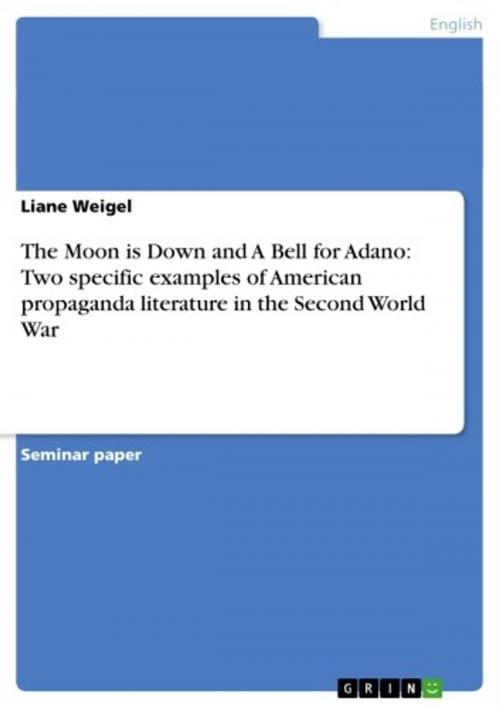The Moon is Down and A Bell for Adano: Two specific examples of American propaganda literature in the Second World War
Nonfiction, Entertainment, Drama, Anthologies| Author: | Liane Weigel | ISBN: | 9783638368902 |
| Publisher: | GRIN Publishing | Publication: | April 20, 2005 |
| Imprint: | GRIN Publishing | Language: | English |
| Author: | Liane Weigel |
| ISBN: | 9783638368902 |
| Publisher: | GRIN Publishing |
| Publication: | April 20, 2005 |
| Imprint: | GRIN Publishing |
| Language: | English |
Seminar paper from the year 2004 in the subject American Studies - Literature, grade: 1, University of Potsdam, 30 entries in the bibliography, language: English, abstract: 'By ten- forty-five, it was all over. The town was occupied, the defenders defeated, and the war finished' and 'Invasion had come to the town of Adano.' these are the opening lines of John Steinbeck's novel The Moon is Down and John Hersey's A Bell for Adano. Although the first merely describes, what could happen when an invading army proclaims 'mission accomplished' prematurely because of undemocratic and inhumane oppression and the second focuses on a humanistic approach towards invasion from a more democratic point of view, both can be considered novels of war propaganda. This is at least what is claimed by many of the reviews. Indeed the historical and biographical background refers to a time, where it was very likely that literature was used for war propaganda. This could open on the one hand the possibility to compare both works on the basis of influencing 'America's mind'. On the other hand, Pulitzer price winning novels seem to contain more than purely negative features of propagandizing. Therefore discussing The Moon is Down and A Bell for Adano as two specific examples of American propaganda literature in the Second World War, at first, means to analyse the importance and the meaning of propaganda with respect to literature as a means of it. Considering the biographical background of the authors as primarily linked to the time, where the novels were written, the next part attempts to present the relationship between personal experiences as war reporters and writing the novels The Moon is Down and A Bell for Adano. In order to compare both works with regard to means of war propaganda the third part includes a discussion of structural features, content and the choosing of the titles. This works also as a kind of preparation for analysing how the enemy is displayed that means the characteristic features in his personality in The Moon is Down and the discussion of the ideal hero represented by Major Joppolo in A Bell for Adano. The last part will then summarize the comparison of the two literary works also as an attempt to reveal problems in considering these works as (purely negative) propaganda in a unilateral sense.
Seminar paper from the year 2004 in the subject American Studies - Literature, grade: 1, University of Potsdam, 30 entries in the bibliography, language: English, abstract: 'By ten- forty-five, it was all over. The town was occupied, the defenders defeated, and the war finished' and 'Invasion had come to the town of Adano.' these are the opening lines of John Steinbeck's novel The Moon is Down and John Hersey's A Bell for Adano. Although the first merely describes, what could happen when an invading army proclaims 'mission accomplished' prematurely because of undemocratic and inhumane oppression and the second focuses on a humanistic approach towards invasion from a more democratic point of view, both can be considered novels of war propaganda. This is at least what is claimed by many of the reviews. Indeed the historical and biographical background refers to a time, where it was very likely that literature was used for war propaganda. This could open on the one hand the possibility to compare both works on the basis of influencing 'America's mind'. On the other hand, Pulitzer price winning novels seem to contain more than purely negative features of propagandizing. Therefore discussing The Moon is Down and A Bell for Adano as two specific examples of American propaganda literature in the Second World War, at first, means to analyse the importance and the meaning of propaganda with respect to literature as a means of it. Considering the biographical background of the authors as primarily linked to the time, where the novels were written, the next part attempts to present the relationship between personal experiences as war reporters and writing the novels The Moon is Down and A Bell for Adano. In order to compare both works with regard to means of war propaganda the third part includes a discussion of structural features, content and the choosing of the titles. This works also as a kind of preparation for analysing how the enemy is displayed that means the characteristic features in his personality in The Moon is Down and the discussion of the ideal hero represented by Major Joppolo in A Bell for Adano. The last part will then summarize the comparison of the two literary works also as an attempt to reveal problems in considering these works as (purely negative) propaganda in a unilateral sense.















